- Home
- Michael Wallace
Blood of Vipers Page 3
Blood of Vipers Read online
Page 3
The argument picked up between the farm couple, voices raised.
“Shh,” he told them. “Whisper, for God’s sake. Why the devil are you still arguing anyway?”
Greta said something to her parents, and they fell silent. She whispered to Cal, “Whether it will be safe to get our things from Oma’s. My father says yes. Mother, no.”
“Oma?”
“That’s my grandmother. We were living with her.”
“That wasn’t your house back there?”
“No. We are from Upper Silesia. We went to town to catch the train for Hamburg, but the planes destroyed the locomotive.”
“And where’s Oma?” he asked quickly, before she made the connection between the air attack on the train and the downed American pilot walking by her side. “Why didn’t she come with you?”
She didn’t answer the question about her grannie. Instead, she kept explaining, as if she’d caught his disbelief that they’d waited until now to flee the Russians. “It all happened so quickly. Two weeks ago, they were fifty miles away. The brave men in the Wehrmacht were already turning the enemy back. We could return home by summer.”
“That’s what they told you?”
She whispered something else that he didn’t pick up, and then added, “We turned around when the train would not run. No way to make it home by night, so we knocked on doors. Nobody answered. Vater thought we would be safe in the barn.”
“How long to Oma’s house?”
“An hour on foot, maybe longer. You are limping. Are you injured?”
“I can manage,” he said. “Hope the old lady is ready to go. We don’t have time to wait around while she gathers up her knitting.”
Greta fell silent.
Trudging along, Cal thought about the coincidence that dropped him into the midst of refugees from the same train he’d buzzed earlier that day. That wasn’t a good thing. He doubted they would differentiate between the British pilot who attacked and the American who refrained.
#
The gray of pre-dawn stained the horizon before they reached the grandmother’s house, and Cal was growing anxious about finding a safe place to hide from the revealing light of day. The nearest he could tell they had outrun the fighting, but the front was a fluid concept and almost nothing would surprise him at this point.
As if to punctuate this worry, the clank of tank treads caught his ear. He grabbed Hans-Peter and lifted a finger to his lips, and then pushed aside the bushes and told the three Germans to hide until he got back. He took the rifle and the binoculars he’d grabbed from the dead Russian, and then left the farm road and pressed through the trees and brush that marked the windbreak until he reached the farm itself. Beyond lay the road, where a column of soldiers pressed east. Cal dropped to his stomach and lifted the binoculars.
He looked at the tank first. It took a moment to pick out details in the gloom, and then his hopes fell.
He’d hoped to see the big white star on the tank. Instead, it was a panzer. Tiger tank, he thought. And though there wasn’t a single other mechanized vehicle in the group, it was a larger force than he’d expected, perhaps as many as several hundred soldiers marching toward the front.
He was on low ground, shadowed by trees that grew alongside a ditch to his right, and since he couldn’t resist getting a closer look, he used the cover of the trees to crawl forward as the men continued past. And wondered. Surely they knew they were marching to their deaths. Why didn’t they drop their weapons and return home to their farms and villages?
He stopped again a hundred yards or so distant from the road, and raised the binoculars. The tank was past now, leaving only the trudging men and a few horse-drawn carts with ammo and supplies. The soldiers had a ragged, disorganized look and slumped with exhaustion.
The majority were teenage boys or older men. The few regular soldiers with them clumped together in knots apart from the others. All of them—young, old, experienced, and green—wore new uniforms.
And why not? The Third Reich might be desperately short on petrol, low on ammunition, and unable to field a single full-strength division, but spare, barely used uniforms? Those were in plentiful supply.
When the column had passed, he returned to the farm road and told Greta what he’d seen. She explained to her parents, and then translated back what Hans-Peter told her. “Volkssturm, national militia. They are taking boys, old men.”
Hans-Peter spoke again and Greta listened and then repeated it for the American.
“They stick a panzerfaust in your hands—that is an antitank gun. It shoots only once. If you are lucky, you have a gun, too, but they have not had any training in how to shoot.”
“That’s how the Soviets held Stalingrad,” Cal said. “Forced men across the Volga at gunpoint. Gave them a rifle and a few bullets. March forward or get a bullet in the back.”
“That is different. We Germans have always been surrounded. We are few and our enemies many. The Russians could win that way. There is no end of them.”
“There are a million Russian widows who would say otherwise,” Cal said.
Greta didn’t reply. It was light enough now that he could see the petulant way that she scrunched her mouth when she was uncomfortable. It reminded him of a girl named Betty he knew back home, the daughter of one of the railroad engineers whose family lived in town. Her father was always away and her mother had six younger children to watch and so Betty ran a little wild. More than once he’d stolen kisses in the dry gulch behind the Mormon chapel until her family moved away in early ’42, when the war disrupted the railroad industry.
“If they’re giving guns to old men now, why didn’t they take your father?”
“I have three brothers. The oldest fell in Egypt in ’43. My younger brother Gerhard fell in Latvia last year. The army stopped us when we crossed the Vistula last winter. My mother explained about my brothers, and they said they would take my father for the Volkssturm instead of her last son. But Father’s eyes were too bad, so they took Werner and gave Father papers.”
“Is Werner still alive?”
Greta glanced at her mother, whose face pinched in pain at the sound of her son’s name. “We do not know. No letters since we saw him last. We do not know if he fell or if he is a prisoner. We know nothing.”
“How old is he?”
“Last week he is fifteen.”
Fifteen. The same age as Cal’s kid brother, Mike. Except Mike was back home, frustrated that the war would end before he got his shot. Cal knew the feeling. After Pearl Harbor, he was sure they’d lick the Japs by summer and the Krauts by ’43 when he turned eighteen, and he’d never get his chance. Oh, he’d had his chance all right.
He rarely thought about death while he was out on the hunt, but it was a different story when he returned to the barracks, first in England, then Belgium, and finally, across the Rhine from a forward base in Germany itself. On the nights when they didn’t have missions, he would lie in his bunk and the images wouldn’t go away. He would see row after row of the bombers they escorted, until the sky was black with their formations. He’d see a B-17 spiraling out of the sky, engines burning. He would see a German pilot, so close that he could study the expression on the other fellow’s face as his Messerschmitt roared past. And after he shot the man’s plane down, he would imagine the other guy’s mother, his dog, and his kid brother.
He would see these things in his sleep, too, and Germany burning beneath him. Would imagine the screams from the great firestorms that swept over the cities they destroyed. Who was it who said that war was hell? He’d thought it was a figure of speech—he didn’t understand that it was very nearly literal.
Cal thought about Greta’s younger brother Werner as they continued their march along the dark, muddy farm road. It was dawn before they reached Grandma’s house. When they arrived, Cal learned why Greta refused to answer questions about her grandmother.
The old woman was dead.
6.
Oma l
ay on the bed on top of a handmade quilt. Her eyes were open, her jaw slack. They had folded her veined hands with crooked, arthritic fingers neatly in front of her. She wore a dress, not a nightgown, so Cal figured they must have brought her up here after she died. A clear vase sat on the nightstand, filled with daisies, slightly wilted.
Greta explained that her father wanted Cal to help carry her downstairs. “We dug a grave in the backyard, but before we could bury her, soldiers from the Waffen-SS came and told us they were taking over the house. They sent us to the village for evacuation.”
Helgard said something and Greta added, “Father was angry. He said it would only take a few minutes, but the officer threatened to shoot him if we didn’t leave at once.”
“What did this guy look like? Shorty, nasty fellow with a mustache like this?” Cal held a finger to his upper lip.
“How did you know that?”
Cal let out a snort. “I should have guessed. Little Hitler.”
“What do you mean?”
“Never mind. You say the grave is already dug?”
He didn’t care to stick around burying Grandma, but from the way Hans-Peter was asking, it was clear they wouldn’t go anywhere until the task was accomplished. Good thing nobody had mentioned Germans requisitioning the house before—and the blasted Waffen-SS, too—or he’d never have come near the place.
No sign of soldiers now, except for a filthy kitchen and empty tin cans of beets and beans strewn about the front room, where muddy boots had trudged over the wood floors.
Hans-Peter got his arms under the dead woman’s shoulders and Cal took her feet. He backed his way out of the room and down the stairs, trying not to look at Oma, who stared back with a death-shrouded gaze. She weighed almost nothing, and her skin was thin, dry, and cool where his hands took her ankles. They brought her outside, to where someone had already dug a grave, midway between the empty chicken coop and a pair of apple trees in bloom.
Oma’s farmhouse sat on a rise in the middle of a larger farm field, together with several cottages that Greta said had once held farm laborers. Poles before the war, and later Russian prisoners of war. Grandpa had died the previous fall and the Reich took back the farm workers and gave a neighboring property owner rights to farm her land. But then the neighbor was shot and robbed and nobody had planted this year.
They wrapped the old woman in her sheets and put her in the ground. Helgard came out of the house with a Bible, which she handed to Hans-Peter. He thumbed through the pages and read what Cal could only guess was one of the Psalms. Meanwhile, daylight was upon them and an ominous buzzing of aircraft sounded in the distance. To the east, the artillery that had continued throughout the night now increased in ferocity. Cal looked around warily.
It was obvious why Little Hitler wanted to take over the farmhouse. It sat on a rise and looked over the surrounding countryside. From the upstairs, observers could watch the road.
But he wondered what would make the SS officer drive the family out before Hans-Peter could bury his dead mother. Did Hans-Peter question the decision, or did he even now expect the Germans to make a heroic stand and drive the enemy from the Fatherland?
Hans-Peter read on and on. A rifle cracked in the distance, answered by a burst of small arms fire. And yet still Hans-Peter insisted on reading to the end, and then led the family in a prayer. It dragged. What the devil was taking him so long?
Cal studied the sky while this continued. No American aircraft, which was not a good sign. By this time yesterday he’d been buzzing over this same countryside, looking for the enemy. He’d spotted several other Blue Noses throughout the day. And today they should be out in equal force.
It meant that HQ had intelligence about the Russian advance. They wouldn’t want to push too close to the front, where they’d come into contact with Soviet ground forces and Yak-9s and Pe-2s in the air. Mistakes happened that way. Incidents. Nobody wanted to end this war today only to start a new war tomorrow.
Hans-Peter’s eyes glistened with tears when he finished praying, but his voice didn’t break. He went to the toolshed and came back with shovels, one of which he handed to Cal, who took it and started shoveling dirt into the grave as fast as he could.
When they finished, Cal tossed the shovel to the ground and wiped the sweat from his forehead. “How did your grandmother die?” he asked Greta.
Greta shifted from one foot to the other, frowned, and looked to the mound of dirt over the grave. “When we saw we would have to run, Vater called the doctor. He came with a black bag.”
“I don’t understand.”
“Oma is eighty-two. We have no horse to pull a cart. She could not walk to the village.”
“Wait a minute. Are you saying...?”
“We explained to Oma. She agreed. It was time. The doctor made her some warm milk and—”
“You poisoned her? Are you serious? You murdered grannie? What’s wrong with you people?”
“It was the kindest way, you must understand. In Silesia, my aunt stayed behind with her children. She had too many nice things, and she said she wasn’t going to let the dirty Russians have them. But when they came—”
“And your pops was reading scriptures like it was a proper Christian burial. What would the priest say about that? Isn’t murder—suicide, whatever—against the church?”
She fell silent.
Cal thought about the daisies on the nightstand, and imagined someone taking the care to cut them, and place them just so in a vase. Look at these, Grandma, while you drink your milk. There, doesn’t that feel better? Get some rest, now.
He felt on the verge of hysteria. It was like he’d fallen into a nest of poisonous snakes, and they were all biting him, their venom burning through his veins, but he couldn’t so much as climb out of the blasted pit. Dammit, he couldn’t take any more of this.
“You’re all out of your minds,” he said. “That’s it, I’m gone. Owf feeterzayn, or however you say it. Give the Führer a goodnight kiss for me, will you?” He snatched up the Russian rifle and turned to go.
They surrounded him, grabbed at his sleeve and wrist.
“Nein, nein,” Helgard pleaded.
“Helfen Sie uns, bitte,” Hans-Peter said.
“Cal, please, I beg you,” Greta said. “Two brothers are dead, my other brother missing. My aunt murdered by Russians, and with her children. My other grandparents vanished after the Hamburg bombing. If you leave us, the same thing will happen to us. Please, try to understand. We are desperate. Do you know what that means?”
Two days earlier he would have said yes, of course he knew about desperation. Now, he was not so sure.
It wasn’t like he’d skated through life; the Jameson family had fallen on hard times in the Great Depression. In 1930, after his father lost his job as an accountant, he’d pitched around for work—somewhere, anywhere. In late December, with four mouths to feed, Father grasped at a letter from a cousin working the rail yards in Carbon, Utah, who promised him a job shoveling coal. Six months earlier, Papa might have scoffed at such a low-paying, backbreaking job, but hunger had a way of clarifying one’s priorities. They scraped together their last few dollars, bought train tickets for Utah, and carried with them only two steamer trunks of clothing and possessions.
Except when they arrived, the job was gone and half the other jobs in Utah coal country as well, throwing hundreds of men into the soup kitchen lines. Papa’s cousin himself had lost his job, but being single, he took the hobo route to return east and move back in with his parents. The Jamesons, on the other hand, had no money; they were stuck in the dry hills of Utah coal country, where the only work was the railroad or the mines, and neither was hiring.
One of Cal’s sharpest memories was a scrawny kid in elementary school showing him that if you tied a rock to the inside of your belt and cinched it up real tight you wouldn’t feel so hungry. It helped pass the morning until the free food the churches handed out at lunch—a cup of chicken broth from the G
reek Orthodox and a peanut butter sandwich from the Mormons.
There were a lot of rocks under belts that year. And the next.
But that was what, a dozen years ago? Eventually the mines started hiring again and Papa got a job, first underground, where he’d emerge with a face like a minstrel in blackface, and then above ground tallying shipping tonnages. They were poor, but fed. Every other trouble in Cal’s life since then amounted to a minor annoyance or the usual soldierly hardships of a winning army, up until that point where he gave his Mustang a dirt bath in a German field.
“Cal?” Greta said. She still had her hand on his wrist and stared at him with those big blue eyes. Her lower lip trembled, but there was strength in her posture, and a determination in her eyes he hadn’t seen before. “You will not leave us to die.” It was more a statement than a question.
“Fine. Let’s get back on that farm road.”
“That is no good. It ends at the millpond four hundred meters past the horse barn.”
“Can’t stay here or we’ll have commies or Nazis on top of us. Maybe both. Could be a battle on this very spot by the end of the day. So what’s it going to be?”
Greta spoke to her parents for a minute, then turned back to Cal. “We have a handcart. It was loaded with some food and clothing and Mutti’s best dishes before the soldiers threw us out. We could join the refugees on the main road, and you can hide underneath the blankets. We’ll leave the rest of it behind. Then, when we get to American lines, you can climb out and make sure they do not hurt us.”
Cal didn’t like the idea of hiding in the handcart while Nazis marched by on the other side of the road, but he couldn’t very well travel in the open, either. Not in his flight uniform and his C-1 vest. And if he changed, they’d think he was a deserter. A shouted order, then a roadside execution when they learned he didn’t speak a lick of German. They’d kill Hans-Peter and his family, too, for giving aid and comfort.
“No towns, we stay to the countryside,” he said. “Are there any forests where we might hide out the day?”

 Crowlord (The Sword Saint Series Book 2)
Crowlord (The Sword Saint Series Book 2) Crowlord
Crowlord The Red Sword- The Complete Trilogy
The Red Sword- The Complete Trilogy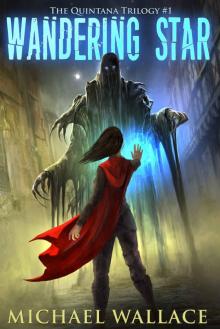 Wandering Star (The Quintana Trilogy Book 1)
Wandering Star (The Quintana Trilogy Book 1)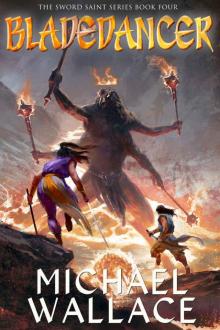 Bladedancer
Bladedancer Sword Saint
Sword Saint The Alliance Trilogy
The Alliance Trilogy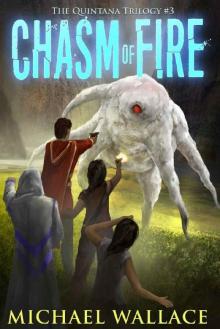 Chasm of Fire
Chasm of Fire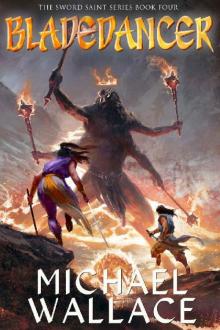 Bladedancer (The Sword Saint Series Book 4)
Bladedancer (The Sword Saint Series Book 4) The Devil's Deep
The Devil's Deep Shadow Walker (The Sword Saint Series Book 3)
Shadow Walker (The Sword Saint Series Book 3) Starship Blackbeard
Starship Blackbeard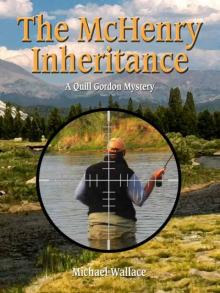 The McHenry Inheritance (Quill Gordon Mystery Book 1)
The McHenry Inheritance (Quill Gordon Mystery Book 1) Sun King (The Void Queen Trilogy Book 3)
Sun King (The Void Queen Trilogy Book 3)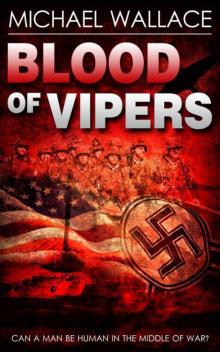 Blood of Vipers
Blood of Vipers Righteous - 01 - The Righteous
Righteous - 01 - The Righteous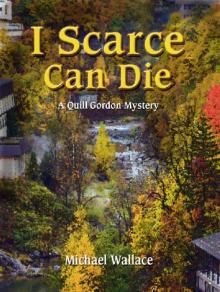 I Scarce Can Die (Quill Gordon Mystery Book 5)
I Scarce Can Die (Quill Gordon Mystery Book 5)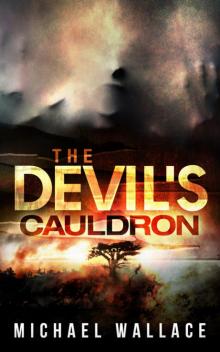 The Devil's Cauldron
The Devil's Cauldron The Wicked (The Righteous)
The Wicked (The Righteous) Crow Hollow
Crow Hollow Righteous03 - The Wicked
Righteous03 - The Wicked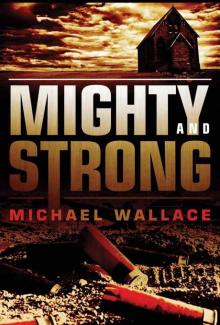 Righteous02 - Mighty and Strong
Righteous02 - Mighty and Strong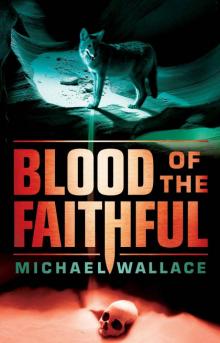 Blood of the Faithful
Blood of the Faithful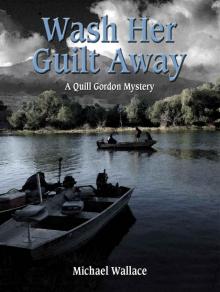 Wash Her Guilt Away (Quill Gordon Mystery Book 2)
Wash Her Guilt Away (Quill Gordon Mystery Book 2) The Kingdom of the Bears
The Kingdom of the Bears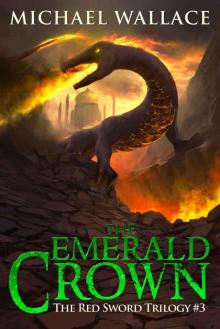 The Emerald Crown (The Red Sword Trilogy Book 3)
The Emerald Crown (The Red Sword Trilogy Book 3) The Dark Citadel
The Dark Citadel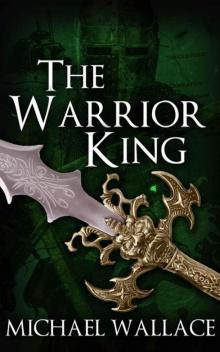 The Warrior King (Book 4)
The Warrior King (Book 4) Rebellion of Stars (Starship Blackbeard Book 4)
Rebellion of Stars (Starship Blackbeard Book 4)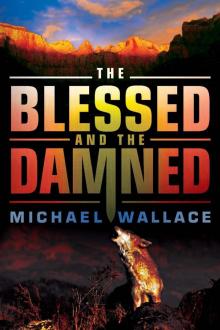 Righteous04 - The Blessed and the Damned
Righteous04 - The Blessed and the Damned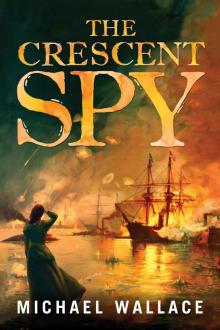 The Crescent Spy
The Crescent Spy Queen of the Void (The Void Queen Trilogy Book 1)
Queen of the Void (The Void Queen Trilogy Book 1)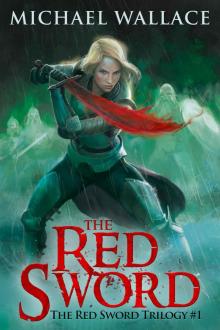 The Red Sword (The Red Sword Trilogy Book 1)
The Red Sword (The Red Sword Trilogy Book 1) The Sentinel (The Sentinel Trilogy Book 1)
The Sentinel (The Sentinel Trilogy Book 1) The Golden Griffin (Book 3)
The Golden Griffin (Book 3)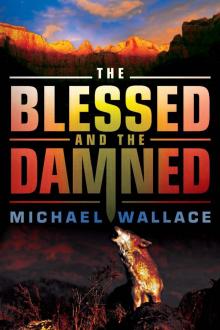 The Blessed and the Damned (Righteous Series #4)
The Blessed and the Damned (Righteous Series #4)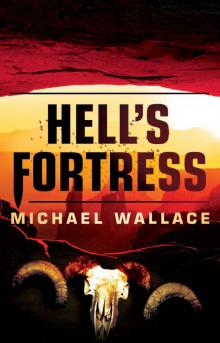 Hell's Fortress
Hell's Fortress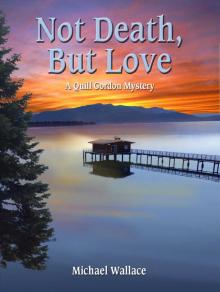 Not Death, But Love (Quill Gordon Mystery Book 3)
Not Death, But Love (Quill Gordon Mystery Book 3) Destroying Angel
Destroying Angel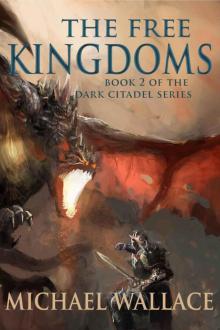 The Free Kingdoms (Book 2)
The Free Kingdoms (Book 2) Dragon Quadrant (The Sentinel Trilogy Book 2)
Dragon Quadrant (The Sentinel Trilogy Book 2) Shattered Sun (The Sentinel Trilogy Book 3)
Shattered Sun (The Sentinel Trilogy Book 3)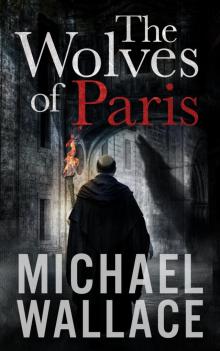 The Wolves of Paris
The Wolves of Paris Lords of Space (Starship Blackbeard Book 2)
Lords of Space (Starship Blackbeard Book 2) Dreadnought (Starship Blackbeard Book 3)
Dreadnought (Starship Blackbeard Book 3) The Village of Dead Souls: A Zombie Novel
The Village of Dead Souls: A Zombie Novel The Black Shield (The Red Sword Book 2)
The Black Shield (The Red Sword Book 2)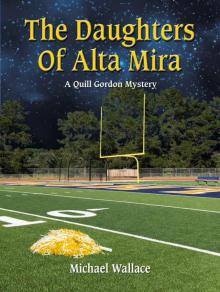 The Daughters Of Alta Mira (Quill Gordon Mystery Book 4)
The Daughters Of Alta Mira (Quill Gordon Mystery Book 4) Mighty and Strong (The Righteous)
Mighty and Strong (The Righteous)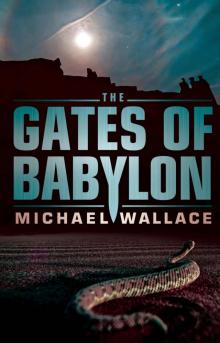 The Gates of Babylon
The Gates of Babylon